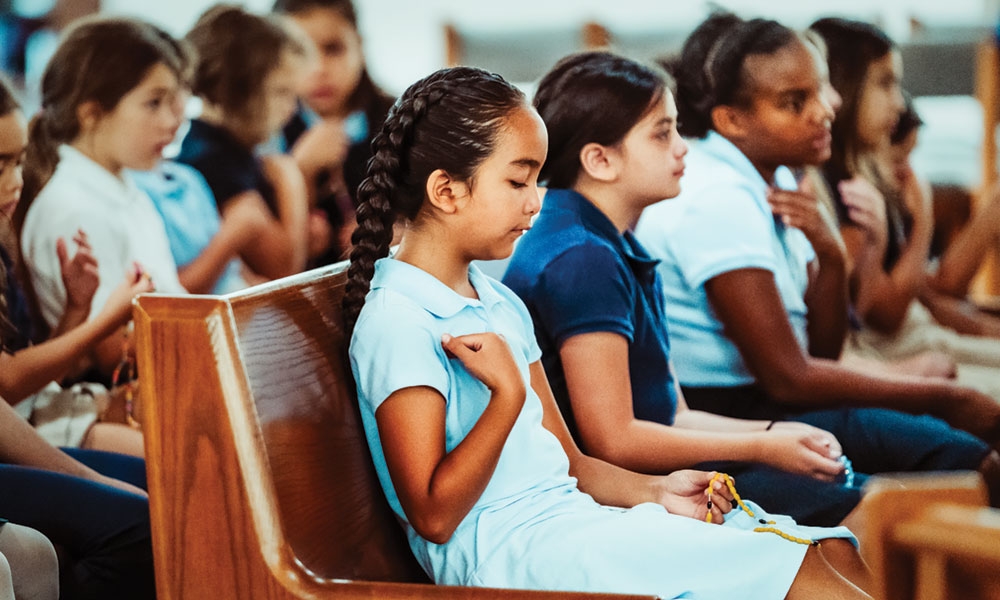
‘Educating is an act of love; it is like giving life’
These words, written by Pope Francis in 2014, offer the ‘why’ behind everything Catholic schools do in the Diocese of Lansing. FAITH editor Stephanie Van Koevering shares additional insight into the loving, life-giving support the diocese shares with families needing financial assistance.
These words, written by Pope Francis in 2014, offer the ‘why’ behind everything Catholic schools do in the Diocese of Lansing. FAITH editor Stephanie Van Koevering shares additional insight into the loving, life-giving support the diocese shares with families needing financial assistance.
If there’s one thing many Catholic parents wonder about when choosing a school for their children, it’s the cost of tuition.
Catholic schooling often requires a level of sacrifice for families, but — thanks to the support provided by the diocese itself — there are many options available to help ensure God’s truth, goodness, and beauty are available to any child that needs it.
During the 2023-24 academic year, the Diocese of Lansing has offered $694,000 in scholarships to help its families afford Catholic schooling for their children.
To support these scholarships and grants, the diocese’s recent Witness to Hope campaign helped raise the necessary funds to expand the grade levels for which funding could be used. This ensures that roughly twice as many students could get the financial support they need.
These scholarships are available through the following programs:
Diocesan grants in the amounts of $750 per student (grades K-8) and $1,000 per student (grades 9-12) are based on need, often bridging the gap for Catholic families. These grants form the cornerstone of our efforts to support students in our communities and are widely used.
The Venerable Augustus Tolton Scholarship aims to increase the number of Catholic African-American students in the Diocese of Lansing’s Catholic schools. It operates under the patronage of Venerable Augustus Tolton (1854-97), a former slave who became the first African-American priest in the United States. This grant totals $500 per student and is gifted to students who: (1) meet diocesan criteria, (2) are African-American or Black, and ((3) show a need of at least $500 over and above the $750 or $1,000 need shown for Diocesan grants.
The St. Jose Luis Sanchez del Rio Scholarship is aimed at helping a more significant number of Catholic Hispanic-American families in the Diocese of Lansing afford a Catholic education for their children. It operates under the patronage of St. Sanchez del Rio (1913-1928), a Mexican youth so devoted to Our Lady of Guadalupe and in love with his faith that he sacrificed his life to defend both. This grant is $500 per student and is awarded to students who: (1) meet diocesan criteria, (2) are Hispanic, and show a need of at least $500 over and above the $750 or $1,000 need shown for Diocesan grants.
In addition to these vital scholarship programs, many schools and parishes offer other resources for Catholic education. For many families, a simple phone call to the school or parish may reveal financial resources they didn’t know existed.
“A Catholic education is among the best gifts parents can give their children,” said Bishop Earl Boyea. “It has been a priority of mine to find ways to make Catholic education more affordable and accessible.”
Support for diocesan educators is also available:
The St. Katherine Drexel Scholarship aims to increase the number of Catholic minority teachers among school staff. This valuable resource helps defray tuition costs for Catholic persons of color who wish to transition into teaching within a Catholic school via the State of Michigan’s Teachers of Tomorrow program. Up to $2,500 in tuition assistance — 50 percent of the total tuition requirement — are available. The program is named for its patron, St. Katharine Drexel (1858-1955), the great pioneer of educational advancement for Native Americans and African Americans.
Through these programs — and the hard work and sacrifice of many dedicated educators, parents and generous donors—the Diocese of Lansing will continue to ensure its Catholic schools are available, accessible, and affordable to families that want to provide their children with an authentically Catholic, academically rigorous education.



